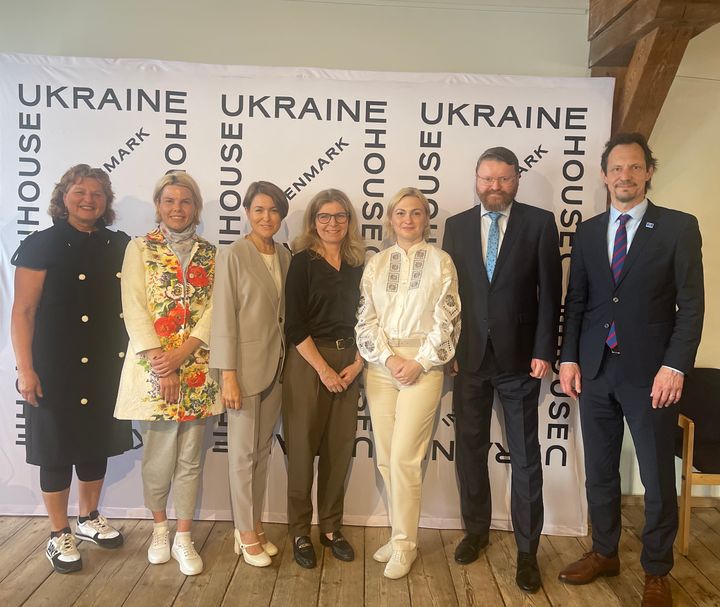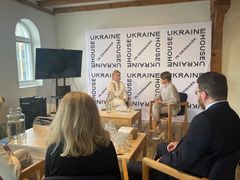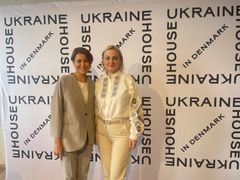"Cultural cleansing is an instrument of war; it is a tool wielded by the Russian Federation against the Ukrainian people." - Visit of Ukrainian MP Yevheniia Kravchuk, Member of the Cultural Committee of PACE, to Ukraine House in Denmark

Copenhagen, Denmark - On Tuesday, May 28th, Ukraine House in Denmark hosted a compelling discussion with Yevheniia Kravchuk, Ukrainian MP, Deputy Chair of the Committee on Humanitarian and Informational Policy in the Ukrainian Parliament, and author of the PACE resolution on cultural erasure during the war. The discussion addressed the challenges and opportunities of safeguarding culture amidst the Russian aggression against Ukraine.
Key points articulated by Yevheniya Kravchuk include:
- Cultural and Physical Destruction: Russia's objective extends beyond physical annihilation of Ukrainians to encompass the obliteration of their identity. This is starkly illustrated by the destruction of language and cultural heritage, including UNESCO sites and heritage significant to specific regions, villages, or families. The collective loss felt by the community when such cultural assets are destroyed is profound.
- Threat to Ukrainian and Crimean Tatar Heritage: Since 2014 and the occupation of Crimea, Ukrainian and Crimean Tatar cultural heritage are under severe threat. Notable examples include the destruction of sites in Crimea, such as the Khan Palace, under the guise of "reconstruction."
- Digitalization of Archives: The digitalization of Ukrainian museum archives is crucial, given the targeted attacks by the Russian army and rampant looting in occupied territories. The scale of looting is unprecedented since World War II, with thousands of objects taken from the Kherson area and illegal archaeological excavations conducted by the Russian Academy of Science in Crimea, transporting Ukrainian artifacts to Russia.
- Criminal Accountability: The Office of the Secretary General has dedicated personnel addressing crimes against cultural heritage, actively working on more than eight criminal cases.
- Cultural Reparations: The cultural reparations are vital, with UNESCO estimating nearly 3.5 billion euros worth of cultural destruction in the second year of the full-scale invasion. These funds could potentially be sourced from frozen Russian assets. While cultural heritage is priceless, the examples of Warsaw and Rotterdam post-World War II illustrate the irreplaceability of many cultural treasures.
- Language and Education Under Attack: Recent attacks on Ukrainian typography, such as the bombing of the "Factor" printing house in Kharkiv, resulted in the death of seven people and the destruction of over 50,000 books, including 40% of school books for the upcoming academic year. The erasure of Ukrainian culture is further compounded by the indoctrination and russification of kidnapped Ukrainian children in Russia. The resolution proposed by Yevheniya aims to address these acts of deliberate cultural cleansing.
- Cultural Cleansing as a War Instrument: The resolution identifies cultural erasure or cultural cleansing as a weapon of war used by the Russian Federation against the Ukrainian people, potentially constituting part of a broader genocidal campaign.
- Demand for Ukrainian Culture: There is significant demand for Ukrainian art, books, and theatre within Ukraine. However, given the prioritization of defense in the state budget, additional aid is needed specifically for cultural preservation and support for artists.
- Intercultural Cooperation: To preserve Ukrainian culture, fostering intercultural cooperation is essential. Initiatives such as partnerships between libraries and museums in Denmark and Ukraine, and translation projects, are crucial.
- Targeting of Ukrainian Creatives: Ukrainian writers and creatives are being targeted, as seen in the tragic fate of the diary of Volodymyr Vakulenko, discovered and published by Viktoria Amelina, both of whom were killed by Russian forces. Many copies of the books of new contemporary authors, such as “Words and Bullets” by Nataliia Korniyenko, were destroyed in the recent attack on the "Factor" printing house.
- Imperial Legacy and "Russian World": The concept of the "Russian world" represents a neo-imperial worldview perpetuated by Russia, which continues to wage what is hoped to be the last imperial war on this continent. Unlike other colonial states, Russia has not reflected on its colonial legacy but continues to perpetuate it. True democracy in Russia necessitates acknowledging and accepting responsibility for these crimes.
Nataliya Popovych, Head of Ukraine House in Denmark, underscored that Russia's attempts to destroy Ukrainian people and culture are part of the broader genocidal character of Russia’s war against Ukraine, but unfortunately Ukraine’s allies are slow to treat this war as genocide (culturecide, ecocide) and react accordingly. At the same time for the Ukrainian culture to have a future, the Ukrainian statehood must be preserved and protected. "You simply cannot sustain culture anywhere else fully but in the home country. There is only so much you can do in diaspora," she emphasized.
The discussion highlighted the multifaceted nature of protecting cultural heritage during Russia’s war of aggression, in which cultural erasure is a key objective. Proactive measures discussed included providing Ukraine with necessary arms and permits to strike into Russian territory and using frozen Russian assets to fund the reconstruction of Ukrainian heritage and culture.
Billeder
Følg pressemeddelelser fra Ukraine House in Denmark
Skriv dig op her, og modtag pressemeddelelser på e-mail. Indtast din e-mail, klik på abonner, og følg instruktionerne i den udsendte e-mail.
Flere pressemeddelelser fra Ukraine House in Denmark
“The Ukrainian Model” — Rethinking Resilience for a New Era6.7.2025 10:29:48 CEST | Pressemeddelelse
Ukraine House in Denmark hosted Ukrainian civic strategist Yevhen Hlibovytskyi for a critical examination of how Ukraine is surviving the war—and what its experience reveals about the future of governance, democracy, and resilience in the 21st century. The event took place on June 24.
“Material Resistance: Ukrainian Design in Action” Exhibition: Ukraine House in Denmark at 3daysofdesign 202527.6.2025 08:00:00 CEST | Pressemeddelelse
Thank you to everyone who visited Ukraine House in Denmark during this year’s 3daysofdesign festival in Copenhagen. Since joining the festival in 2023, Ukraine House has become both a cultural landmark and a vital platform for showcasing contemporary Ukrainian design. Our historic space in the heart of Copenhagen once again welcomed visitors from around the world, hosting exhibitions, conversations, and moments of solidarity during the festival’s three vibrant days — June 18 to 20.
Ukraine House in Denmark presents “Material Resistance: Ukrainian Design in Action” Exhibition for 3daysofdesign in Copenhagen13.6.2025 08:00:00 CEST | Presseinvitation
From June 18 to 20, 2025, Ukraine House in Denmark will present “Material Resistance: Ukrainian Design in Action”, a collective exhibition showcasing innovative and resilient Ukrainian design as part of Copenhagen’s prestigious 3daysofdesign festival. The project is organized in partnership with the Library of Ukrainian Materials, the Ukrainian Association of Furniture Makers, and the design fair Material Matters (London).
Language as a Weapon: Confronting the Kremlin’s Rhetoric of Hate and Incitement to Genocide10.6.2025 08:00:00 CEST | Press release
As Russia wages war on the battlefield, it also wages a mental war of hate and disinformation. At Ukraine House in Denmark, a panel of leading experts came together to reveal how Kremlin-sponsored hate speech and disinformation are not only deepening Russia’s war against Ukraine—but may themselves constitute international crimes.The panel examined how language becomes weaponized: how it dehumanizes, distorts, and incites. This is not just about information manipulation—it is about cultivating moral indifference to atrocity.
“Taste of Ukraine”: An Evening of Remembrance and Solidarity with the Crimean Tatar People9.6.2025 08:00:00 CEST | Press release
On May 25, Ukraine House in Denmark hosted a special edition of its series “Taste of Ukraine”, dedicated to the Crimean Tatar people—their history, their struggle, and their resilient identity. The event took place in the shadow of May 18 which marks the deportation of Crimean Tatars by the Soviet regime in 1944, a historical trauma that continues to shape the destiny and identity of Ukraine’s indigenous people. More than a dinner, the evening became a space of communal remembrance, a moment to pause and confront the long history of oppression and reflect on the enduring fight for identity and belonging.
I vores nyhedsrum kan du læse alle vores pressemeddelelser, tilgå materiale i form af billeder og dokumenter samt finde vores kontaktoplysninger.
Besøg vores nyhedsrum

